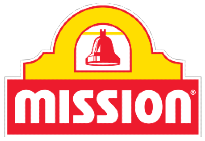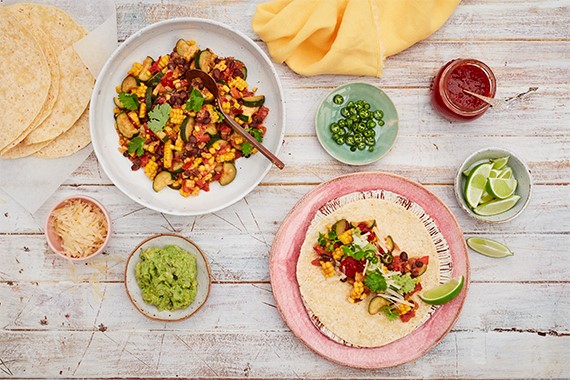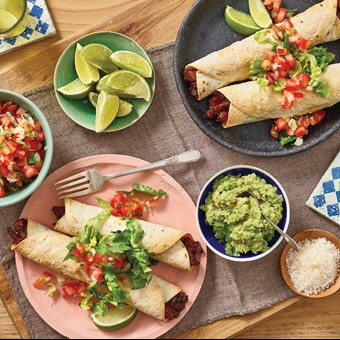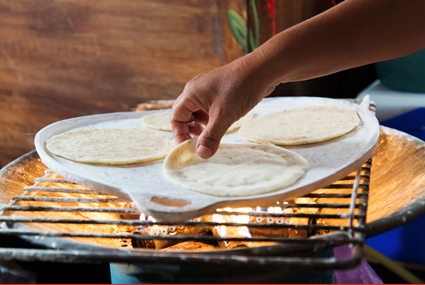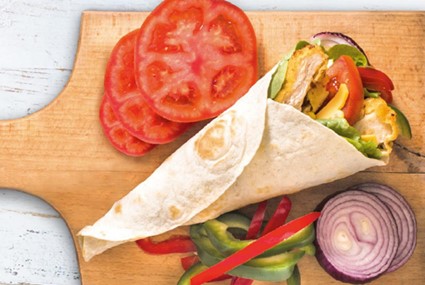Modern Slavery Statement
Modern Slavery Act 2018 (Cth)
I. Introduction
This is Gruma Oceania Pty Ltd’s (ABN: 35 117 976 002) third Modern Slavery Statement pursuant to the Australian Modern Slavery Act 2018, covering the period from 1 January 2022 to 31 December 2022. All references in this Statement to “Gruma Oceania”, the “Company”, “Mission Foods”, “we” or “us” means a reference to Gruma Oceania Pty Ltd.
As a food manufacturer, Gruma Oceania Pty Ltd is committed to reducing modern slavery risks in its business dealings, recognizing the important role we play in the fight against any form of slavery or human trafficking. Consistent with the principles set in our Gruma Code of Ethics and internal policies, we take a zero-tolerance approach to the use of all forms of modern slavery including child exploitation, prison and forced labour, slavery, servitude, human trafficking, debt bondage, deceptive recruitment and forced marriage. We are committed to ethical business practices through the respect of human rights in all our business dealings, while implementing and strengthening policies and encouraging a transparent performance, in line with the requirements of the Modern Slavery Act.
Gruma Oceania seeks to do business with suppliers that have similar values, ethics and sustainable business practices, including those related to human rights. The Company recognises that as a large purchaser of goods and services, the business conduct of the Company and its suppliers can have a significant impact on its performance and reputation within the communities in which it operates. Thus, the actions of all Company members and suppliers must always be based on values such as integrity, honesty, trust, impartiality, respect, tolerance, freedom, rationality and legality, as well as with commitment to the environment and in acknowledgment of human rights. In accordance with our values, we continue to develop our approach on identifying and addressing modern slavery and human trafficking related risks.
Our report outlines the efforts we have made and will continue to make to assess and address risks of modern slavery and human trafficking in our business, employment practices, and supply chain, as well as the steps we are taking to have in place the most appropriate responses to these risks.
II. Our Structure and Business Operations
The reporting entity for this Statement is Gruma Oceania Pty Ltd, a proprietary limited company headquartered in Epping, Victoria, trading as Mission Foods. Gruma Oceania is an 2 indirect subsidiary of Gruma, S.A.B. de C.V., a publicly traded Mexican company listed on the Mexican Stock Exchange, and one of the world’s leading tortilla and corn flour producers.
Gruma Oceania’s main operation is as a producer of wheat and corn flour tortillas, corn chips and other types of flatbreads, such as wraps, pita, chapatti, naan and pizza bases for the foodservice and retail markets. We supply product to all major food retailers with sales close to $300 million dollars per annum which translates into approximately 50,000 tonne of product for Australian consumers. Our main brands are Mission® and Rositas® (pictured below), and our main customers include retail and supermarket chains and foodservice restaurants, many of whom we have long-standing relationships with. We also manufacture private label brands for some of our retail market customers.

Gruma Oceania employs 380 permanent employees who come from culturally and linguistically diverse backgrounds, most are new migrants who have started their working careers in Australia with Mission Foods. Gruma Oceania has an enterprise agreement with the Australian Manufacturing Workers' Union (hereinafter “AMWU”) which represents a large number of production workers.
Mission Foods is dedicated to a multicultural workforce, where migrants continue to contribute to the Company’s economic development. Working with Mission Foods plays a critical role in achieving better settlement and integration outcomes for migrant communities. Employment facilitates access to resources including food, housing and healthcare and plays a key role in becoming part of the community.
The workers represent the following birth nationalities: Bangladesh, Bosnia, Canada, China, Colombia, Croatia, Cuba, East Timor, El Salvador, Britain, USA, Ethiopia, Fiji, Hong Kong, India, Indonesia, Iraq, Italy, Japan, Kenya, Lebanon, Macedonia, Malaysia, Malta, Sri Lanka, Mauritius, Mexico, Myanmar, Nepal, New Zealand, Pakistan, Papua New Guinea, Peru, Philippines, Russia, Samoa, Serbia, Somalia, Spain, Sudan, Thailand, Turkey, Vietnam, and Zimbabwe.
Gruma Oceania maintains its principal office and state-of-the-art manufacturing facility at 49 Gateway Boulevard, Epping, Victoria 3076. More information about Gruma Oceania can be found on our website www.missionfoods.com.au.
III. Brief Overview of Our Supply Chain
The products and services that contribute to our own finished goods are obtained locally and abroad, which include raw materials used in the manufacture of our products. We also purchase finished goods to resell in the Australian market. Additionally, our supply chain includes ancillary services that contribute to our main operations, such as transporters and carriers, warehousing, cleaning services and security providers, among others.
Categories of products and services in our supply chain include:
- Ingredients for our products
- Packaging materials
- Refuse disposal and treatment
- Equipment and equipment services, including but not limited to installations or repairs
- Industrial refrigeration
- Cleaning and janitorial supplies
- Security services
- Transporters, warehousing and logistics services
- Marketing
- Professional advisors
- IT services
We have approximately 73 direct suppliers from Tier 1 for ingredients/raw materials, packaging and traded goods. Tier 1 suppliers are based mostly in Australia, with a few based in the United States, Japan, Canada, Thailand, Mexico and New Zealand.
We have also identified the following countries as indirect sources of our imported ingredients:
| Country | Ingredients |
| Australia | 23 |
| Canada | 2 |
| China | 9 |
| Colombia | 1 |
| Denmark | 1 |
| Germany | 4 |
| India | 1 |
| Malaysia | 2 |
| New Zealand | 5 |
| Thailand | 1 |
| The Netherlands | 2 |
| United Kingdom | 1 |
| USA | 23 |
| Poland | 1 |
For our operations, we use several service providers for activities such as laundry services, office supplies, cleaning services, maintenance, telecommunications, equipment rental, car hire, marketing activities, laboratory services, and finished goods distributors.
IV. Risks of Modern Slavery Practices in Our Operations and Supply Chain
A. Our operations:
Within our own operations, we believe the risk of engaging in modern slavery conduct is very low. All of our workers are employed in Australia, and the Company has strict controls in place for our employment practices, which comply with all local laws and regulations in Australia, aligning with the Fair Work Commission legislation and the National Employment Standards. All employment decisions are based on the principle of merit with no instances of forced labour. Most of our employees are directly employed, meaning they are covered by the terms of the collectively negotiated enterprise agreement, GRUMA OCEANIA EBA 2021, which was approved by the Fair Work Commission in Australia and the AMWU trade union. The agreement stipulates the minimum conditions for wages, hours of work, overtime conditions, additional remuneration, leave entitlements and redundancy benefits.
Our Company´s salaried roles are commonly engaged under the terms of common law contracts, subject to the minimum conditions under the National Employment Standards, the Fair Work Act 2009 and supported by a range of policies providing additional benefits as paid parental and/or family and domestic violence leave.
We have a robust recruitment policy and conducting eligibility checks for foreign employees to work in Australia using the VIVO Immigration Department site for the safeguarding against human trafficking and/or forced labour.
B. Our supply chain:
We recognise risks that modern slavery may present in our supply chain, therefore our Company´s policies seek to ensure that our operations and supply chain management continuously reduce modern slavery risks.
The identification of risk within our large and complex supply chain is an essential step to understanding what is required in order to prioritize subsequent actions. We have continued our efforts to classify supplier risks and map key parts of our supply chain to improve our understanding of modern slavery risks.
The Company sources products and services from suppliers that range from small independent family-owned companies to large multinationals, predominantly sourcing from Australia. We recognise the leverage we have within our supply chain is often limited and to initiate meaningful and sustainable change we need to collaborate with our supply chain partners to develop initiatives which improve the working conditions of their employees and suppliers.
Modern slavery risk assessment process categorises our supply chain into the following three groups:
| Tier 1 | Suppliers providing goods or services directly to Gruma Oceania. |
| Tier 2 | Suppliers providing goods or services to Tier 1 suppliers. |
| Tier 3 | Suppliers providing goods or services to Tier 2 suppliers |
There may be inherent risks further along the supply chain in Tiers 2 and 3 suppliers. An example of this are the uniform requirements at our facilities. While uniform washing services are managed locally in Australia, the garment manufacturing generally occurs overseas where modern slavery risks are identified as a higher risk.
The Tier 1 suppliers are predominantly based in Australia. Please see the charts below.

| Tier 1 Supplier Risk Assessment | ||
| Country | Count | Classification |
| Australia | 61 | Low |
| USA | 6 | Low |
| Japan | 2 | Low |
| Thailand | 1 | Medium |
| Canada | 1 | Low |
| Mexico | 1 | Medium |
| New Zealand | 1 | Low |
Our primary focus is with Tier 1 suppliers whom we directly source from. However, we will continue to conduct a deeper assessment across our supply chain to identify risks throughout the supply chain. The supply chain heat map assessment we completed has identified risks across the end-to-end supply chain.
We have consulted public domain data on globally identified risks such as the nature of a product or service, geographic location where they are sourced, type of workforce employed, weak rule of law, migration workforce and other socio-economic factors provided by different organizations and indexes to identify areas with increased vulnerability.
Some ingredients that we use in our products sourced from agriculture, such as wheat (used for flour), sugar and palm oil, have been globally recognized as having increased vulnerability to modern slavery, based on data provided by the Commodity Atlas. Although most of our ingredients are sourced locally, this is globally recognised as a high-risk segment: and, both locally and overseas, there may be direct risk in our suppliers and indirect risk in their suppliers, of which we recognise we have lesser visibility. Such risk of a modern slavery conduct in our supply chain may be increased in accordance with our purchasing volumes of a particular ingredient or product, such as bulk wheat flour and RSPO palm shortening, which represent bigger volumes in dollars spent with respect to other ingredients.
We recognise, it may be difficult to detect these risks coming from geographic locations outside of Australia. Based on criteria such as prevalence, vulnerability and government response certain regions such as South America, south and southeast Asian countries are recognised by the Global Slavery Index as having increased modern slavery risks. Based on this index, there may be modern slavery risks in our finished goods that use ingredients sourced from these regions. While we have not classified our suppliers according to this data, we have made an internal classification of our raw material suppliers based on publicly available data from the Corruption Perceptions Index, which ranges from low to medium. As with raw materials, such risk may be increased in accordance with our purchasing volumes of ingredients sourced from abroad, such as RSPO palm shortening, considering our bulk wheat flour needs are met by Australian suppliers.
We also recognise our service providers may fail to comply with their own employment work health and safety obligations to their employees and workers, particularly those services that may target marginalised and vulnerable groups such as cleaning, transporting, and warehousing. Also, outsourcing by our suppliers may be another area of risk, where marginalised groups may be targeted for short-term or seasonal labour.
To our knowledge, none of our major suppliers that we work with directly were reported as engaging in modern slavery practices during the reporting period. Notwithstanding, part of our efforts to better understand our supply chain includes strengthening our due diligence process as described further below.
V. Actions Taken to Address Modern Slavery Risks
Over this reporting period, we continued to make progress in implementing actions and maintaining our policies to assist on the prevention of modern slavery risks associated with our operations and supply chains. These are our most relevant policies and due diligence processes that prevent modern slavery:
- Code of Ethics and Code of Conduct: outlines the values and ethical standards all employees shall observe when dealing with other members of the Company and its clients, suppliers, counterparties, competitors, and government officials, as well as the standards of conduct our personnel shall observe during the performance of their duties in the workplace.
- Whistleblower Policy: encourages reporting any misconduct, including breaches of legislation, criminal activity, and unethical behavior. The Whistleblower Policy enables anonymous reporting as well as the ability to report to an externally and independently managed website/hotline. During this reporting period, the Whistleblower platform has not identified any reports related to modern slavery.
- Human Rights Policy: prohibits the employment of child labour in contravention of the minimum working age and education attendance requirements across all our operations in compliance with child labour laws. Our Company has no employees under the age of 18 years.
- Fraud and Corruption Control Policy: outlines the approach to controlling fraud and corruption in and against the Company.
- Recruitment Policy: recruitment and selection processes followed by the HR team which operate within an approved framework and in accordance to set procedures. The work rights and visa status of all Australian employees are verified before commencing employment, including verification with VEVO platform for employees who are not citizens or permanent residents. All employment contracts are issued by the HR team and in strict compliance with the National Employment Standards and the Fair Work Act 2009. Our employees are paid electronically via direct debit in accordance with an electronic time and attendance system.
- Ethical Procurement Policy: requires our suppliers to comply with the Modern Slavery Act.
- Gender Equality Policy: outlines equal opportunities for all employees in the workplace.
- SEDEX: Our Company is a member of SEDEX (Supplier Ethical Data Exchange), where our information is available to our customers.
- SMETA 4 Pillar Ethical Audits: an audit was completed in July 2022 by an external SMETA auditor, focusing on Human Rights and Equal Opportunity in compliance with the Australian labour law requirements.
- Modern Slavery Committee (“Committee”) annual meeting held by our key management personnel that represent the Production, Procurement and Supply Chain, Human Resources, Maintenance, Sustainability and Compliance, and Quality Assurance areas.
For our supply chain, we are committed to working with suppliers with our shared position on modern slavery practices. We currently conduct due diligence on all suppliers via an Ethical Procurement Self-Assessment in line with our Ethical Procurement Policy, through which we seek to obtain data from our suppliers regarding their regulatory compliance, employment, health and safety and environmental practices in the supplier’s own operations and supply chain.
During the reporting period, our policies along with the Ethical Procurement Self Assessment were sent to 56 of our suppliers, where 32 of them have acknowledged our policies, 20 have completed the Anti-Slavery Supplier Questionnaire , and 4 have provided their own social responsibility statements. In total, 58 of our suppliers have received the Code of Conduct and Ethical Procurement Policy.
We have taken the following actions to reduce our exposure to modern slavery risks:
- Engaging with suppliers on modern slavery issues and establishing a standard supply contract clause, which sets the minimum requirements they need to fulfill to comply with our modern slavery framework.
- Assessing risks in our supply chain based on a supply chain heat map assessment.
- Implementing a modern slavery statement in all the induction paperwork for onboarding employees. For this reporting period, the modern slavery statement was used as a training and induction tool for 181 employees of the Company.
- Sharing Gruma Oceania´s Supplier Code of Conduct, Ethical Procurement Policy and compliance expectations to all suppliers of goods and services of the Company.
- Training all of our employees with the Modern Slavery Statement. The Company recognizes it is paramount to equip our teams with the correct training to help them make ethical and responsible decisions.
Our policy in relation to remediation is to immediately investigate the incident and, together with the relevant supplier, determine what needs to be done to cease the relevant practice; protect and compensate the victim; and ensure the incident does not occur again. If the supplier does not indicate a willingness to participate in these processes in good faith, we will terminate that supplier’s agreement.
Gruma Oceania understands the importance of collaboration with suppliers and other key stakeholders, such as employees, consumers, clients, communities, and organizations, to respond effectively to the modern slavery risks presented in the Company´s operation and supply chain.
Some of the efforts made in 2022 to expand our stakeholders´ engagement were:
- Participating with our supplier network and service providers.
- Partnering with Sedex to assess modern slavery risks and due diligence processes.
- Clearly communicating our modern slavery expectations through our Company´s terms and conditions, applicable policies, and supplier´s Ethical Procurement Self-Assessment and Anti-Slavery Supplier Questionnaire.
As one of our Company´s commitment for next year, we will continue to expand our stakeholder´s engagement to better understand the potential risks and harms of modern slavery in our operation.
VI. Assessing Effectiveness of our Actions
In order to provide full visibility and continuity between our modern slavery responses, the table below keeps track of the actions the Company has achieved during the past reporting periods, as well as the ongoing ones we continue to address during this reporting period for further improvement in our modern slavery framework.
| Action | 2020 | 2021 | 2022 |
| Working group establishment in charge of overseeing the management of compliance with the Modern Slavery Act. | X | ✓ | ✓ |
| Policies gap analysis and development. | X | ✓ | ✓ |
| Employee and staff induction. | X | ✓ | ✓ |
| Employee and staff training. | X | ✓ | ✓ |
| Improve awareness of grievance systems. | X | ✓ | ✓ |
| Performance of risks assessment of structure, operation, and supply chain. | ✓ | ✓ | ✓ |
| Engagement with SEDEX. | X | ✓ | ✓ |
| Supplier requirement to complete the Ethical Procurement Self-Assessment form. | ✓ | ✓ | ✓ |
| Publication of Modern Slavery Statement on the Company´s website. | ✓ | ✓ | ✓ |
| Expanding stakeholders´ engagement. | X | In process of implementation | ✓ |
| Amendment of Terms and Conditions to address modern slavery compliance. | X | ✓ | ✓ |
| Delivery of copy of our Code of Ethics and Ethical Procurement Policy to suppliers. | X | ✓ | ✓ |
We recognise modern slavery risks are inevitable, especially in the second and third tiers of our supply chain. With this in mind we are determined to continue improving and developing a faster response framework which will help us expand our visibility in all areas, making it easier to monitor our actions and supplier performance and reducing modern slavery risks, through the following:
- Continuous improvement in our risk assessment for existing and new suppliers by identifying high-risk geographic locations, or high-risk types of product and services through the supply chain heat map which provides the Company with visibility of low, medium, and high-risk categories within our supply chain, which will inform action planning required from high-risk suppliers.
- Further improving our efforts so we can be able to establish qualitative and quantitative indicators going forward to monitor the effectiveness of actions implemented and keeping track of our improvements with respect to audits performed and self-assessments received; internal response to any findings; employee training and education on modern slavery risks; complaints raised through a grievance mechanism and the resolution of those complaints and implementation of supplier contracts with modern slavery compliance clauses.
- Investigation of any complaints made to Human Resources and the VP of Operations under the Whistleblower Policy.
- Conducting audits to labour hire providers and verification of documentation to ensure compliance with employment requirements, as well as continued Social Accountability external audits and surveys conducted by customers on Gruma Oceania’s employment practices. This includes sharing information through questionnaires on the SEDEX platform.
- Continue implementing meetings of the Committee in order to monitor risks throughout the year, strengthen due diligence and investigate any complaints.
VII. Addressing modern slavery risks, as a result of post Covid-19 effects
Our Company understands that as part of the post pandemic disruption, supply chains are still vulnerable to modern slavery risks. Based on the foregoing and as part of our effort to deal with post Covid-19 business dealings, we are committed to continue addressing the possible risks in our supply chain and internal operations; our top priority is to ensure the health, safety and protection of our workers, staff and suppliers across our supply chain, avoiding any kind of human rights violations or modern slavery practices caused by or as a result of the pandemic.
VIII. Consultation, collaboration and approval
This Modern Slavery Statement has been approved by Gruma Oceania’s Board of Directors. Gruma Oceania does not own or control any other entities and therefore consultation with another entity was not required.
Our Committee composed by our key management personnel was consulted and collaborated in the preparation of this Statement, taking into consideration the work the Company does with auditors, suppliers, labour providers, customers, and industry bodies to ensure the risk of modern slavery is minimised.
This statement was unanimously approved by the Board of Directors of Gruma Oceania in its capacity as principal governing body on 20 June 2023. The Board has authorized Luis Mitre, a member of the Board of Directors and Vice-President of Operations of Gruma Oceania, to sign this statement on behalf of the Board.
Luis Mitre
Vice President of Operations
Gruma Oceania Pty Ltd
20 June 2023
| Download >> |
